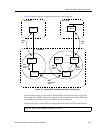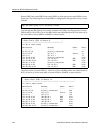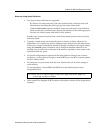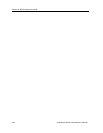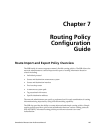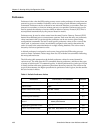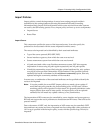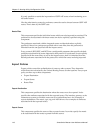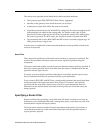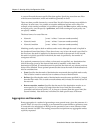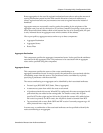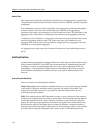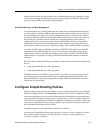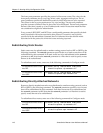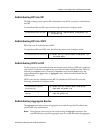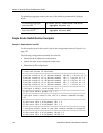
SmartSwitch Router User Reference Manual 111
Chapter 7: Routing Policy Configuration Guide
The routes to be exported can be identified by their associated attributes:
• Their protocol type (RIP, OSPF, BGP, Static, Direct, Aggregate).
• Interface or the gateway from which the route was received.
• Autonomous system from which the route was learned.
• AS path associated with a route. When BGP is configured, all routes are assigned an AS
path when they are added to the routing table. For interior routes, this AS path
specifies IGP as the origin and no ASs in the AS path (the current AS is added when
the route is exported). For BGP routes, the AS path is stored as learned from BGP.
• Tag associated with a route. Both OSPF and RIP version 2 currently support tags. All
other protocols have a tag of zero.
In some cases, a combination of the associated attributes can be specified to identify the
routes to be exported.
Route-Filter
This component specifies the individual routes which are to exported or restricted. The
metric to be associated with these routes can also be explicitly specified using this
component.
The metric associated with the exported routes are inherited unless explicitly specified. If
there is no metric specified with a route-filter, then the metric is inherited from the one
specified with the export-source.
If a metric was not explicitly specified with both the route-filter and the export-source,
then it is inherited from the one specified with the export-destination.
Every protocol (RIP, OSPF, and BGP) has a configurable parameter that specifies default-
metric associated with routes exported to that protocol. If a metric is not explicitly
specified with the route-filter, export-source as well as export-destination, then it is
inherited from the default-metric associated with the protocol to which the routes are
being exported.
Specifying a Route Filter
Routes are filtered by specifying a route-filter that will match a certain set of routes by
destination, or by destination and mask. Among other places, route filters are used with
martians and in import and export policies.
The action taken when no match is found is dependent on the context. For instance, a
route that does match any of the route-filters associated with the specified import or
export policies is rejected.



